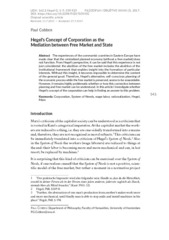Hegel’s Concept of Corporation as the Mediation between Free Market and State
Hegelov pojam korporacije kao medijacije između slobodnog tržišta i države
Апстракт
The experiences of the communist countries in Eastern Europe have
made clear that the centralized planned economy (without a free market) does not function. From Hegel’s perspective, it can be said that this experience is not just coincidental: the abolition of the free market includes the abolition of the institutional framework that enables insight into the formation of particular interests. Without this insight, it becomes impossible to determine the content of the general good. Therefore, Hegel’s alternative, self-conscious planning of the economic process while the free market is preserved, seems to be unavoidable.
However, it remains highly problematic whether or how this connection between planning and free market can be understood. In this article I investigate whether Hegel’s concept of the corporation can help in finding an answer to this problem.
Iskustva komunističkih zemalja u istočnoj Evropi učinila su jasnim da centralno planirana ekonomija (bez slobodnog tržišta) ne funkcioniše. Iz Hegelove perspektive se može razumeti da ovo iskustvo nije puka slučajnost: ukidanje slobodnog tržišta podrazumeva ukidanje institucionalnog okvira koji omogućava uvid u formiranje pojedinačnih interesa. Bez ovog uvida postaje nemoguće utvrditi sadržaj opšteg dobra. Stoga, Hegelova alternativa samosvesnog planiranja ekonomskog procesa uz očuvanje slobodnog tržišta deluje neizbežno. Međutim, ostaje vrlo problematično da li i kako se ova veza između planiranja i slobodnog tržišta može razumeti. U ovom prilogu ću posebno istraživati da li Hegelov pojam korporacije može da pomogne u pronalaženju rešenja ovog problema.
Кључне речи:
corporation / system of needs / wage labor / rationalization / Hegel, Georg Vilhelm Fridrih / Marx, Karl / korporacija / sistem potreba / radna snaga / racionalizacija / Hegel, Georg Vilhelm Fridrih / Marks, KarlИзвор:
Filozofija i društvo/Philosophy and Society, 2017, 28, 3, 543-559
DOI: 10.2298/FID1703543C
ISSN: (Online) 2334-8577; (Print) 0353-5738
WoS: 000418565000008
[ Google Scholar ]Институција/група
IFDTTY - JOUR AU - Cobben, Paul PY - 2017 UR - http://rifdt.instifdt.bg.ac.rs/123456789/1379 AB - The experiences of the communist countries in Eastern Europe have made clear that the centralized planned economy (without a free market) does not function. From Hegel’s perspective, it can be said that this experience is not just coincidental: the abolition of the free market includes the abolition of the institutional framework that enables insight into the formation of particular interests. Without this insight, it becomes impossible to determine the content of the general good. Therefore, Hegel’s alternative, self-conscious planning of the economic process while the free market is preserved, seems to be unavoidable. However, it remains highly problematic whether or how this connection between planning and free market can be understood. In this article I investigate whether Hegel’s concept of the corporation can help in finding an answer to this problem. AB - Iskustva komunističkih zemalja u istočnoj Evropi učinila su jasnim da centralno planirana ekonomija (bez slobodnog tržišta) ne funkcioniše. Iz Hegelove perspektive se može razumeti da ovo iskustvo nije puka slučajnost: ukidanje slobodnog tržišta podrazumeva ukidanje institucionalnog okvira koji omogućava uvid u formiranje pojedinačnih interesa. Bez ovog uvida postaje nemoguće utvrditi sadržaj opšteg dobra. Stoga, Hegelova alternativa samosvesnog planiranja ekonomskog procesa uz očuvanje slobodnog tržišta deluje neizbežno. Međutim, ostaje vrlo problematično da li i kako se ova veza između planiranja i slobodnog tržišta može razumeti. U ovom prilogu ću posebno istraživati da li Hegelov pojam korporacije može da pomogne u pronalaženju rešenja ovog problema. T2 - Filozofija i društvo/Philosophy and Society T1 - Hegel’s Concept of Corporation as the Mediation between Free Market and State T1 - Hegelov pojam korporacije kao medijacije između slobodnog tržišta i države IS - 3 VL - 28 SP - 543 EP - 559 DO - 10.2298/FID1703543C ER -
@article{
author = "Cobben, Paul",
year = "2017",
abstract = "The experiences of the communist countries in Eastern Europe have
made clear that the centralized planned economy (without a free market) does not function. From Hegel’s perspective, it can be said that this experience is not just coincidental: the abolition of the free market includes the abolition of the institutional framework that enables insight into the formation of particular interests. Without this insight, it becomes impossible to determine the content of the general good. Therefore, Hegel’s alternative, self-conscious planning of the economic process while the free market is preserved, seems to be unavoidable.
However, it remains highly problematic whether or how this connection between planning and free market can be understood. In this article I investigate whether Hegel’s concept of the corporation can help in finding an answer to this problem., Iskustva komunističkih zemalja u istočnoj Evropi učinila su jasnim da centralno planirana ekonomija (bez slobodnog tržišta) ne funkcioniše. Iz Hegelove perspektive se može razumeti da ovo iskustvo nije puka slučajnost: ukidanje slobodnog tržišta podrazumeva ukidanje institucionalnog okvira koji omogućava uvid u formiranje pojedinačnih interesa. Bez ovog uvida postaje nemoguće utvrditi sadržaj opšteg dobra. Stoga, Hegelova alternativa samosvesnog planiranja ekonomskog procesa uz očuvanje slobodnog tržišta deluje neizbežno. Međutim, ostaje vrlo problematično da li i kako se ova veza između planiranja i slobodnog tržišta može razumeti. U ovom prilogu ću posebno istraživati da li Hegelov pojam korporacije može da pomogne u pronalaženju rešenja ovog problema.",
journal = "Filozofija i društvo/Philosophy and Society",
title = "Hegel’s Concept of Corporation as the Mediation between Free Market and State, Hegelov pojam korporacije kao medijacije između slobodnog tržišta i države",
number = "3",
volume = "28",
pages = "543-559",
doi = "10.2298/FID1703543C"
}
Cobben, P.. (2017). Hegel’s Concept of Corporation as the Mediation between Free Market and State. in Filozofija i društvo/Philosophy and Society, 28(3), 543-559. https://doi.org/10.2298/FID1703543C
Cobben P. Hegel’s Concept of Corporation as the Mediation between Free Market and State. in Filozofija i društvo/Philosophy and Society. 2017;28(3):543-559. doi:10.2298/FID1703543C .
Cobben, Paul, "Hegel’s Concept of Corporation as the Mediation between Free Market and State" in Filozofija i društvo/Philosophy and Society, 28, no. 3 (2017):543-559, https://doi.org/10.2298/FID1703543C . .


